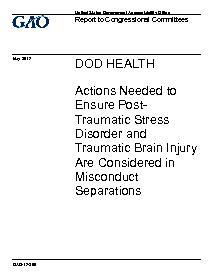DOD HEALTH : Actions Needed to Ensure Post-Traumatic Stress Disorder and Traumatic Brain Injury Are Considered in Misconduct Separations
What GAO Found
GAO’s analysis of Department of Defense (DOD) data show that 62 percent, or 57,141 of the 91,764 servicemembers separated for misconduct from fiscal years 2011 through 2015 had been diagnosed within the 2 years prior to separation with post-traumatic stress disorder (PTSD), traumatic brain injury (TBI), or certain other conditions that could be associated with misconduct. Specifically, 16 percent had been diagnosed with PTSD or TBI, while the other conditions, such as adjustment and alcohol-related disorders, were more common. Of the 57,141 servicemembers, 23 percent, or 13,283, received an "other than honorable" characterization of service, making them potentially ineligible for health benefits from the Department of Veterans Affairs (VA).
GAO found that the military services’ policies to address the impact of PTSD and TBI on separations for misconduct are not always consistent with DOD policy. For example, contrary to DOD policy, Navy policy does not require a medical examination—or screening—for certain servicemembers being separated in lieu of trial by court-martial to assess whether a PTSD or TBI diagnosis is a mitigating factor in the misconduct charged. This type of separation occurs when a servicemember facing a trial by court-martial requests, and is approved, to be discharged administratively. In addition, GAO found that two of the four military services have TBI training polices that are inconsistent with DOD policy.
GAO also found that the Army and Marine Corps may not have adhered to their own screening, training, and counseling policies related to PTSD and TBI. For example, GAO found that 18 of the 48 nongeneralizable sample separation packets reviewed for Marine Corps servicemembers administratively separated for misconduct lacked documentation showing that the servicemember had been screened for PTSD and TBI. During interviews with Army officers, GAO found that some officers may not have received training to identify mild TBI symptoms, despite Army policy that all servicemembers should be trained. Further, GAO found instances in which both Army and Marine Corps may not have adhered to their counseling policies, which require that servicemembers, specifically prior to requesting separation in lieu of trial by court-martial, be counseled about their potential ineligibility for VA benefits and services. For 11 of the 48 separation packets included in GAO’s analysis of Army servicemembers who requested separation in lieu of trial by court-martial, there was no documented evidence—or the evidence was unclear—as to whether the servicemembers received counseling.
Finally, while Army and Marine Corps have some available data on servicemembers’ screenings, training, and counseling, the military services do not use these data to routinely monitor whether they are adhering to relevant policies. Federal internal control standards call for agencies to establish monitoring activities to ensure internal control systems and evaluate results. Without monitoring adherence to these policies, the military services cannot provide assurance that servicemembers with PTSD and TBI are receiving adequate consideration of their conditions as well as the services DOD has established for them.
Geachte bezoeker,
De informatie die u nu opvraagt, kan door psychotraumanet niet aan u worden getoond. Dit kan verschillende redenen hebben,
waarvan (bescherming van het) auteursrecht de meeste voorkomende is. Wanneer het mogelijk is om u door te verwijzen naar de bron
van deze informatie, dan ziet u hier onder een link naar die plek.
Als er geen link staat, kunt u contact opnemen met de bibliotheek,
die u verder op weg kan helpen.
Met vriendelijke groet,
Het psychotraumanet-team.
59 pagina's | [Washington] : GAO (U.S. Government Accountability Office)
https://www.gao.gov/assets/690/684608.pdf


